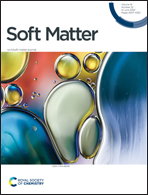Microstructure of continuous shear thickening colloidal suspensions determined by rheo-VSANS and rheo-USANS†
Abstract
Research on shear thickening colloidal suspensions demonstrates that measurements of the microstructure can elucidate the source of the rheological material properties in the shear thickened state as well as critically test simulations and theory based on a variety of mechanisms such as enhanced lubrication hydrodynamics, elastohydrodynamics, and contact friction. Prior work on continuous shear thickening dispersions with a well-defined shear thickened state identified the formation of hydroclusters as characteristic of this state, determined the anisotropy in the nearest neighbor distribution, and used this information to test prevailing theories and simulations. However, important questions remain about the mesoscale (i.e., particle cluster scale) microstructure of the shear thickened state. Here we employ neutron scattering methods applied to shearing colloidal dispersions of spherical particles with two extremes of friction and lubrication surface properties to resolve the longer-length scale microstructure in the shear thickened state. Hydroclusters are shown to be highly localized, in agreement with prior neutron scattering and direct optical measurements, but in disagreement with the most recent simulations that predict a longer-range structure formation. These results combined with prior measurements provide experimental evidence about the length scale of microstructure formation in continuous shear thickening suspensions necessary to improve our understanding of the phenomenon as well as guide theoretical investigations that quantitatively link nanoscale forces to macroscopic properties in the shear thickened state.



 Please wait while we load your content...
Please wait while we load your content...